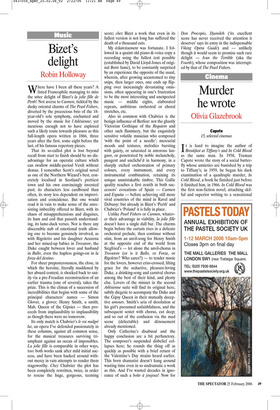Bizet’s delight
Robin Holloway
Where have I been all these years? A listed Francophile managing to miss the utter delight of Bizet’s la jolie fille de Perth! Not averse to Carmen, tickled by the dusky oriental charms of The Pearl Fishers, diverted by the precocious brio of the 18year-old’s sole symphony, enchanted and moved by the music for l’Arlésienne; yet incurious enough not to have explored such a likely route towards pleasure as this full-length opera written in 1866, three years after the first, some eight before the last, of his famous repertory pieces.
That its so-called plot is lost beyond recall from start to finish should be no disadvantage for an operatic culture which can swallow middle-period Verdi without demur. I remember Scott’s original novel as one of the Northern Wizard’s best, concretely localised in Scotland’s prettiest town and his own convincingly invented past; its characters less cardboard than often, its story less dependent on improvisation and coincidence. But one would read it in vain to make sense of the unresisting imbecility offered to Bizet, with its chaos of misapprehensions and disguises, its ham and cod that passeth understanding, its lame-duck verses. Nor is there any discernible nub of emotional truth allowing one to become genuinely involved, as with Rigoletto and his daughter Acuzena and her mixed-up babies in Trovatore, the Duke caught between lover and husband in Ballo, even the hapless goings-on in la forza del destino.
For sheer preposterousness, the close, in which the heroine, literally maddened by her absurd context, is shocked back to sanity via a pre-Freudian reconstruction of an earlier trauma (one of several), takes the prize. This is the climax of a succession of incredibilities that begins with some of the principal characters’ names — Simon Glover, a glover; Henry Smith, a smith; Mab, Queen of the Gipsies — then proceeds from implausibility to implausibility as though there were no tomorrow.
Its only match is Chabrier’s le roi malgré lui, an opera I’ve defended passionately in these columns, against all common sense, for the musical treasures surviving triumphant against an ocean of impossibles. La jolie fille is comparable in other ways, too: both works sank after mild initial success, and have been hacked around without mercy in vain attempts to render them stageworthy. Chez Chabrier the plot has been completely rewritten, twice, in order to rescue the huge, gorgeous, teeming score; chez Bizet a work that even in its fullest version is not long has suffered the death of a thousand cuts.
My éclaircissement was fortunate. I followed in a quaint old piano-&-voice copy a recording using the fullest text possible (established by David Lloyd-Jones of original Boris fame), to be constantly surprised by an experience the opposite of the usual, wherein, after growing accustomed to tiny snips, then larger ones, one ends up flipping over increasingly devastating omissions, often appearing in one’s frustration to be the most interesting and unexpected music — middle eights, elaborated repeats, ambitious orchestral or choral stretches, etc.
Also in common with Chabrier is the benign influence of Berlioz: not the ghastly Victorian Gothique of the Requiem and other such flummery, but the exquisitely sensitive volatile musician who composed ‘with the point of a needle’; mercurial moods and textures, melodies bursting with gaiety, or saturated in amorous languor, or penetrated by noble melancholy, pungent and uncliché’d in harmony, in a sharply etched orchestration of primary colours, every instrument, and every instrumental combination, retaining its unique unmistakable timbre. This Gallic quality reaches a first zenith in both successors’ evocations of Spain — Carmen and España — before achieving still more vivid countries of the mind in Ravel and Debussy: but already in Bizet’s ‘Perth’ and Chabrier’s ‘Poland’ it is fully in place.
Unlike Pearl Fishers or Carmen, whatever their advantage in viability, la jolie fille doesn’t have a single dull bar. The charms begin before the curtain rises in a delicate orchestral prelude, then continue without stint, from an anvil-song for Henry Smith at the opposite end of the world from Siegfried’s — let alone the anvil-chorus in Trovatore (or is it Ballo, or Forza, or Rigoletto? Who cares?) — to tender music for the lovers, however criss-crossed, lilting grace for the seductive, pleasure-loving Duke, a drinking-song and carnival chorus among the best of their kind, and plenty else. Lovers of the minuet in the second Arlésienne suite will find its original here, subtly diegetic to accompany the Duke and the Gipsy Queen in their mutually deceptive amours. Smith’s aria of desolation at his girl’s presumed unfaithfulness, and the subsequent sextet with chorus, cut deep; and so out of the confusion via the mad scene (delectable) and dénouement already mentioned.
Only Catherine’s disabusal and the happy conclusion are a bit perfunctory. The composer’s suspended disbelief collapses here; he rounds the thing off as quickly as possible with a brief return of the Valentine’s Day strains heard earlier. This born dramatist doesn’t hang around wasting time even in so undramatic a work as this. And I’ve wasted decades in ignorance of such a boîte à joujoux! Now for Don Procopio, Djamileh (‘its excellent score has never received the attention it deserves’ says its entry in the indispensable Viking Opera Guide) and — unlikely though it would seem to promise such rare delight — Ivan the Terrible (aka the Fourth), whose composition was interrupted by that of The Pearl Fishers.


































































 Previous page
Previous page